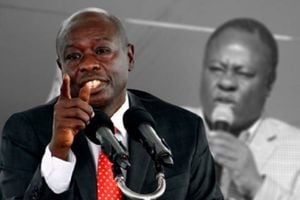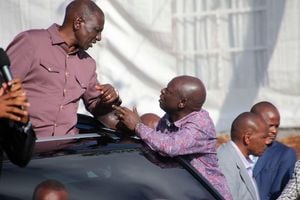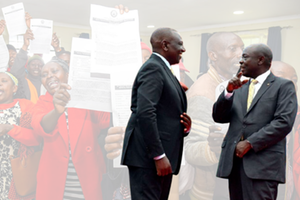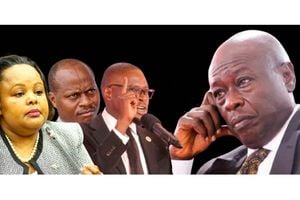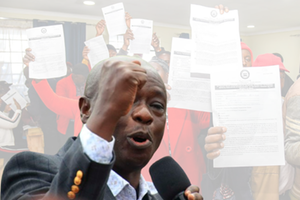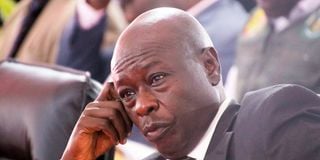
Deputy President Rigathi Gachagua.
After a string of court losses aimed at halting his impeachment, Deputy President Rigathi Gachagua’s strategists have shifted their focus to the Senate even as some of his close allies sought emissaries to reach out to President William Ruto.
Some of the 291 members of the National Assembly who signed up for the motion have since indicated that they will withdraw their support on Tuesday during the final vote, but the DP’s camp still does not fancy his chances in the National Assembly.
Assuming the 54 MPs who did not sign the motion are against it, Mr Gachagua would still require an additional 63 to secure the mandatory 117 MPs needed to reject the motion.
Mr Gachagua has made a total of 11 attempts to block consideration of a motion for his removal from office that received overwhelming backing from members of the National Assembly. The House on Saturday extended public participation as it moved to cover any possible loophole that can be used to challenge the process.
With court options running out for him, Mr Gachagua now sees the Senate as his other alternative to scuttle the bid to topple him. The Senate is seen to be sober and more objective based on past decisions. With a small number of 67 members – 47 elected and 20 nominated – Mr Gachagua’s team believes he could get a favourable verdict.
Impeachment motions
However, only the 47 elected senators vote during impeachment motions, which means Gachagua would require the support of 17 Senators to defeat the motion against him.
The widespread hostility witnessed during the concluded public participation, the DP allies believe, could work in his favour to rally senators to reject the motion.
In the Senate, President Ruto’s United Democratic Alliance (UDA) has a total of 31 Senators, followed by Mr Raila Odinga’s ODM (20), Jubilee (5), Wiper (4), UDM (3), Ford Kenya (1), NRA (1) and DP (1). Jubilee and Wiper have since declared their support for Mr Gachagua.
Constitutional lawyer Bobby Mkangi told the Nation that voting at the Senate should be by delegation, meaning a total of 47 votes just like in the impeachment of governors. This means Mr Gachagua requires 17 senators to block his impeachment.
Nation has since established that a governor has been in talks with some religious leaders with a request that they reach out to President Ruto for a truce, according to a State House source. The source indicated that the politician, perceived as a close ally of Mr Gachagua, has been working behind the scenes to have the two leaders reach out to each other.
Lent credence
Makueni Senator Dan Maanzo also lent credence to the reported shuttle diplomacy by Mr Gachagua allies. “We know the church is already seeking a truce for the two to talk. With the widespread public backlash the President could decide to throw the MPs under the bus by asking them to drop the matter based on the public participation,” said Mr Maanzo.
In the National Assembly, Mr Gachagua has been slotted to face the full House on Tuesday between 5pm and 7pm to defend himself on the allegations levelled against him in the motion sponsored by Kibwezi West MP Mwengi Mutuse.
Speaker of the National Assembly Moses Wetang’ula said the Deputy President can choose to come personally or send his legal team.
Upon voting on the motion on Tuesday where the motion must be supported by 233 MPs, Mr Wetang’ula has two days to communicate the resolution of the National Assembly to his Senate counterpart Amason Kingi.
The Constitution requires the Senate, which is the trial chamber, to convene a meeting to hear charges against the DP within seven days where the 11 impeachment grounds by Mr Mutuse will be looked at together with supporting evidence.
Mr Kingi has already warned Senators against commenting on the impeachment of Mr Gachagua as it may be construed that the House has taken a decision on it.
“During the pendency of these impeachment processes in the National Assembly and Senate, I wish to caution honourable senators to desist from publicly commenting on the merits or demerits of the matters. Doing so would amount to anticipation of debate which is an infringement of Standing Order 99 of the Senate,” Mr Kingi said.
The MPs will be under intense pressure following various opposing views expressed by Kenyans during the countrywide public participation exercise.
While others supported the call, others told MPs that there are important issues affecting Kenyans such as health and the new university funding model that the lawmakers should consider as priorities.
During the public participation in Nairobi, Mr Peter Kaloki from Embakasi West said Mr Gachagua is not a problem to the people of Kenya.
“We cannot be here saying that the Deputy President must go, they must go together with the President,” Mr Kaloki said.
Mr Kennedy Atambo said they also need public participation in the transition from National Health Insurance Fund (NHIF) to Social Health Authority (SHA)
Support of the motion
“Before transiting to SHA, we would have been called here and told of its benefits, people are suffering in this country,” Mr Atambo said.
The Nation has learnt that the 291 MPs who signed the motion were given a target of the number of people who should sign in support of the motion.
Gatanga MP Wakili Edward Muriu said the public participation will not only enable the lawmakers to debate the motion from an informed position, it will also have a significant effect on the final vote that will be taken in the house on Tuesday.
“If people say no and Parliament says yes, then that will be a big dilemma for MPs,” Mr Muriu said.
Reports detailing the views received from across the constituencies as coordinated from the county venues shall be collated and consolidated into one report, which will be tabled in the House by Mr Mutuse who is the mover of the special motion.
Security plans in and outside Parliament have also been finalised as the House does not want to take any chances when they will be debating and voting for the motion.
The number of officers manning the House has been increased as the leadership tries to prevent any chances of being invaded again by protesters as was the case on June 25 during the anti-finance Bill, 2024 demonstrations.


